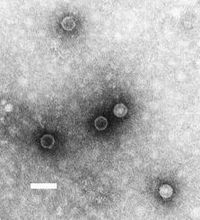
Photo from wikipedia
Drug screening methods targeting HAV IRES-mediated translation with reporter assays are attractive and useful for drug repurposing. Nicotinamide (vitamin B3, niacin) has been shown to effectively inhibit HAV replication. ABSTRACT… Click to show full abstract
Drug screening methods targeting HAV IRES-mediated translation with reporter assays are attractive and useful for drug repurposing. Nicotinamide (vitamin B3, niacin) has been shown to effectively inhibit HAV replication. ABSTRACT Hepatitis A virus (HAV) infection often causes acute hepatitis, which results in a case fatality rate of 0.2% and fulminant hepatitis in 0.5% of cases. However, no specific potent anti-HAV drug is available on the market to date. In the present study, we focused on inhibition of HAV internal ribosomal entry site (IRES)-mediated translation and investigated novel therapeutic drugs through drug repurposing by screening for inhibitors of HAV IRES-mediated translation and cell viability using a reporter assay and cell viability assay, respectively. The initial screening of 1,158 drugs resulted in 77 candidate drugs. Among them, nicotinamide significantly inhibited HAV HA11-1299 genotype IIIA replication in Huh7 cells. This promising drug also inhibited HAV HM175 genotype IB subgenomic replicon and HAV HA11-1299 genotype IIIA replication in a dose-dependent manner. In the present study, we found that nicotinamide inhibited the activation of activator protein 1 (AP-1) and that knockdown of c-Jun, which is one of the components of AP-1, inhibited HAV HM175 genotype IB IRES-mediated translation and HAV HA11-1299 genotype IIIA and HAV HM175 genotype IB replication. Taken together, the results showed that nicotinamide inhibited c-Jun, resulting in the suppression of HAV IRES-mediated translation and HAV replication, and therefore, it could be useful for the treatment of HAV infection. IMPORTANCE Drug screening methods targeting HAV IRES-mediated translation with reporter assays are attractive and useful for drug repurposing. Nicotinamide (vitamin B3, niacin) has been shown to effectively inhibit HAV replication. Transcription complex activator protein 1 (AP-1) plays an important role in the transcriptional regulation of cellular immunity or viral replication. The results of this study provide evidence that AP-1 is involved in HAV replication and plays a role in the HAV life cycle. In addition, nicotinamide was shown to suppress HAV replication partly by inhibiting AP-1 activity and HAV IRES-mediated translation. Nicotinamide may be useful for the control of acute HAV infection by inhibiting cellular AP-1 activity during HAV infection processes.
Journal Title: Journal of Virology
Year Published: 2023
Link to full text (if available)
Share on Social Media: Sign Up to like & get
recommendations!